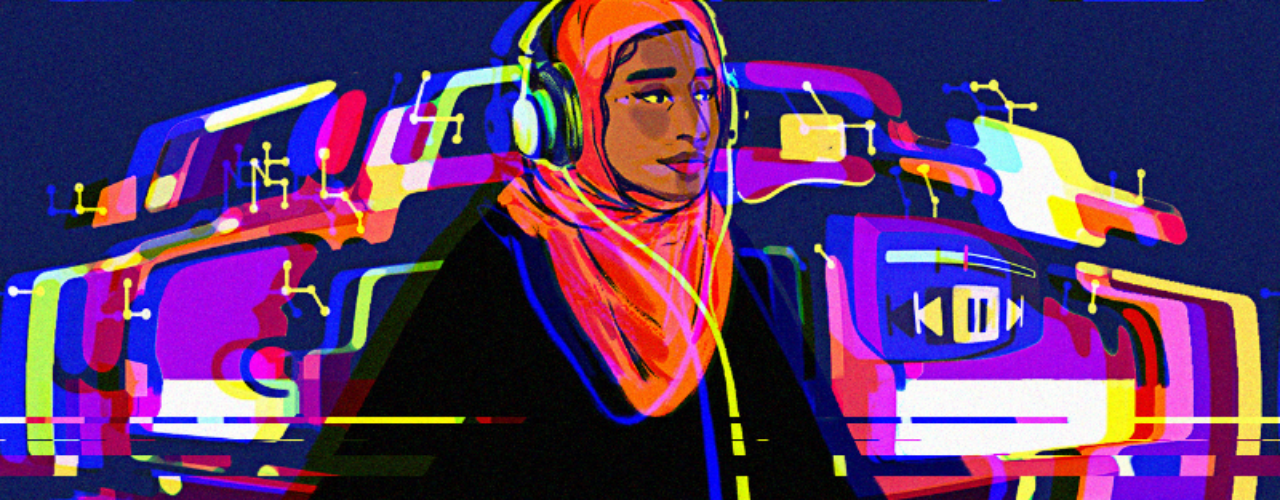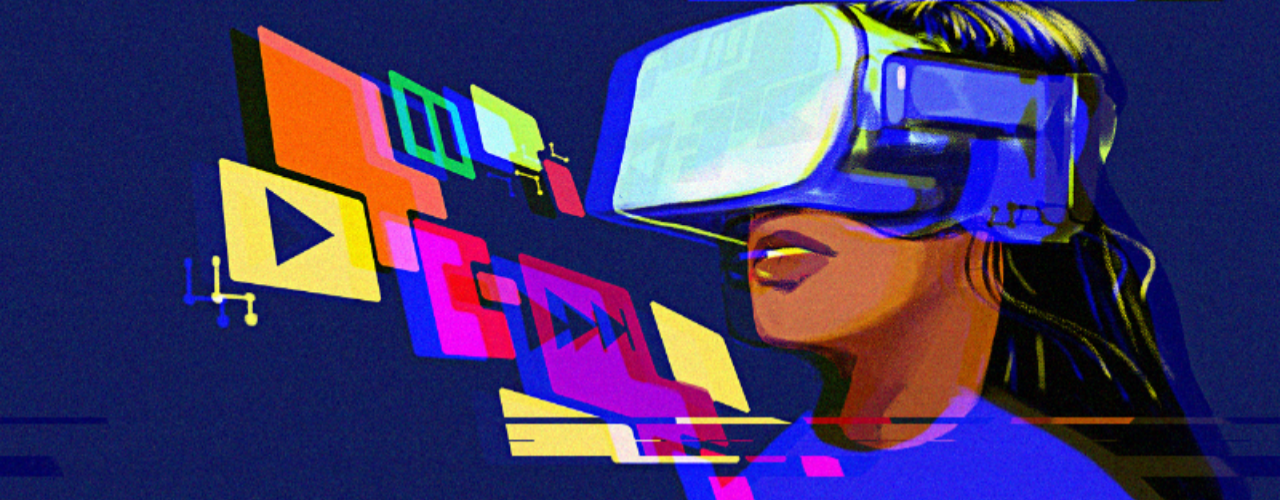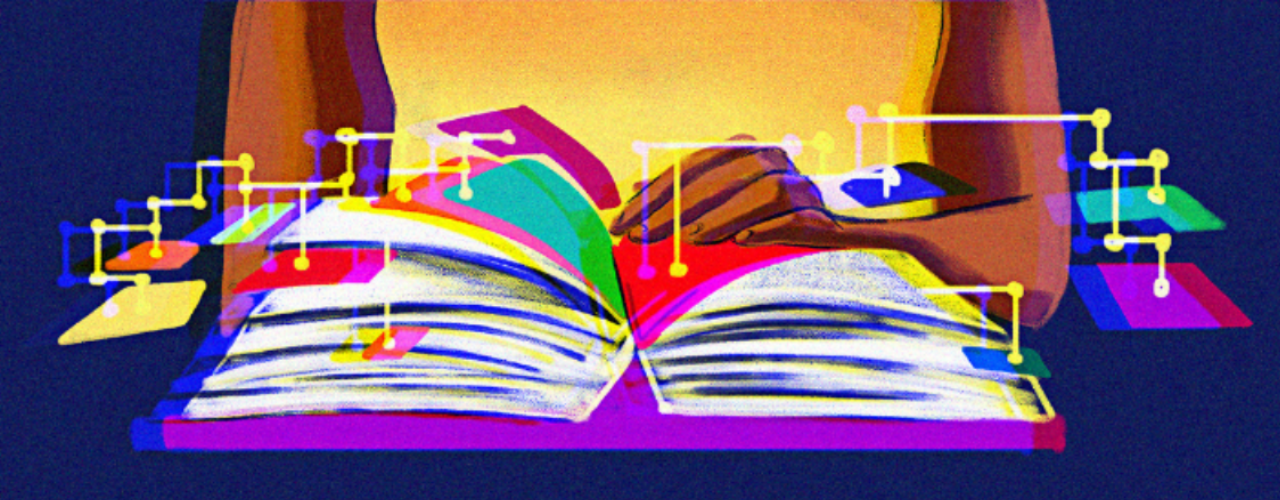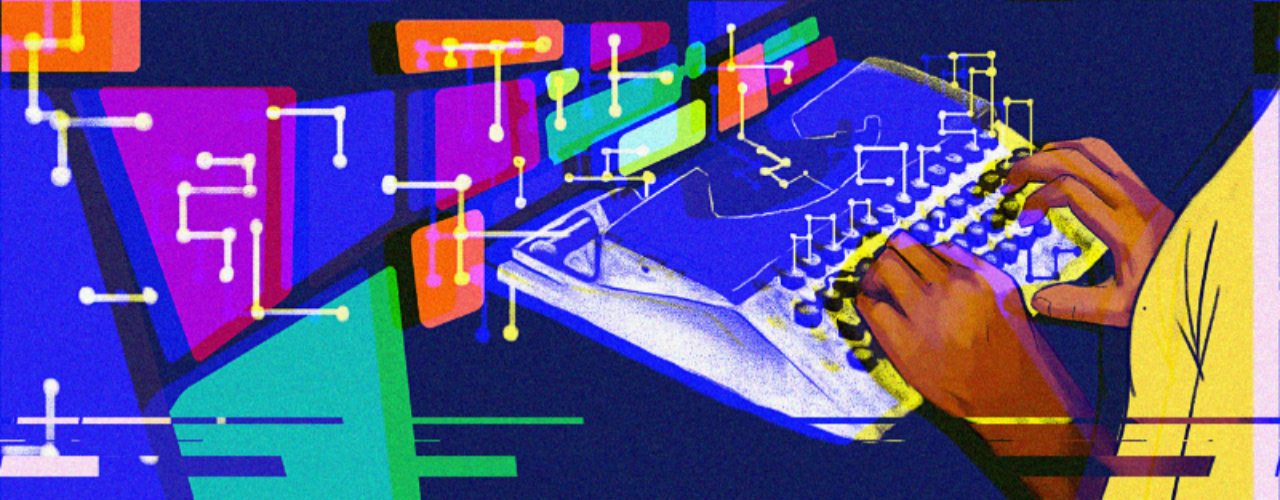We asked researchers, activists, and practitioners to give us their go to recommendations for 2021 on Big Tech and describe what about the given piece spoke to them. They took us up on the ask and did not disappoint. From the world of research, media, and long form, we bring to you a holiday list of reflection, leisure, and introspection like no other.
Also, check out our experts’ insightful perspectives and commentary on Big Tech developments of 2021 in our special series, 21 Takes on Big Tech from 2021.
Podcasts

As a podcaster, naturally I’ll choose a podcast! I have loved listening to Paris Marx’s show Tech Won’t Save Us. These are curated conversations with some of the leading thinkers that help distill and disseminate great research from academic circles so the rest of us can digest and infuse it into our popular understanding – AND our activism.
Bama Athreya, Open Society Foundations
I would like to suggest the excellent Brazilian podcast in Portuguese, MediaLab, as well as this podcast covering labor precarization by Observatorio de Plataformas in Ecuador.
Flora Partenio, Development Alternatives with Women for a New Era (DAWN)
The Good Robot Podcast comes almost immediately to mind. The questions that Eleanor Drage and Kerry Mackereth ask in all their episodes – What is good technology? Is ‘good’ technology even possible? And what does feminism have to say about it? – and the variety of answers they get are deeply insightful and provocative. Full disclosure: I feature in one of their episodes, but they have a lot of episodes.
Ranjit Singh, Data & Society
Visual Media

It ended its five-year run in 2016, but there has yet to be a television series that explores the implications of living in a surveillance society better than Person of Interest. It’s also an exciting show in its own right.
Blayne Haggart, Centre for International Governance Innovation (CIGI)
The film Coded Bias illuminated the issue of Artificial Intelligence (AI) exacerbating the biases that are built into it, and gave a platform for some very powerful women, especially women of color, to express their voice and expertise on these issues. While watching the film, The Social Dilemma, I found myself being surprised as to the level at which the very people who created Facebook actually won’t let their children participate in it because they realize it’s so damaging.
Deborah James, Our World Is Not for Sale (OWINFS) network
One documentary I would recommend is The Great Hack. It looks at how big data harvested from social media has been used by companies like Cambridge Analytica to influence political outcomes in places like the US, UK, Myanmar, and beyond. It’s a story that many of us know, but it’s great to get a deep-dive on it.
Farzana Nawaz, Independent labor rights expert
I was blown away by We Know What You Did During Lockdown. This exquisite short film by playwright James Graham and director Juliet Riddell (Financial Times) speaks eloquently to the collective lockdown experience, and gives character to the pernicious undertow of devices and predictive systems to which we have outsourced our lives – or have we? Honourable mentions: K.D. Dávila’s Please Hold and Radheya Jegatheva’s iRony.
Julia Powles, he University of Western Australia
I was watching this documentary from the BBC series, Follow the Food, called Hi-tech solutions. It struck me the way they portray farms without farmers, the use of vertical farming in some places like Singapore, in contrast with the reality that food and agriculture are not just about production or trade, it is really part of people’s culture. It also creates a lot of space to raise questions on the way technology is being used now in agriculture, challenging the perspective of how digital technologies are being used.
Kartini Samon, GRAIN
I really liked the Billion Dollar Code, which recounts how Google stole the idea for Google Earth. More importantly, it was well-made with very good historical points and political points around technology.
Parminder Jeet Singh, IT for Change
I have been finding inspiration in all things old instead of the new. I watched this movie Colossus: The Forbin Project, a 1970s movie directed by Joseph Sergeant. There are some strange things in it, like a romantic angle in the middle, but he was addressing the problem of AI way back then. It also has elements of the Cold War, so there’s an interesting geopolitical angle. What happens when the Soviet Union’s AI goes against the US?
Renata Avila, Digital Civil Society Lab
Even though it may sound a bit unusual, the 2014 computer game, The Talos Principle, caught my attention this year, especially for its story line. Without giving away any spoilers, its fictional narrative addresses a key philosophical issue about Artificial Intelligence. What distinguishes AI from human intelligence? As someone researching the use of AI on healthcare, it has made me reflect on, how the human approach has something essential that AI may not replace: curiosity.
Matheus Falcao, Health Law Research Centre, University of São Paulo
Books

I know the movie was quite famous, but I really think there’s value in going back to the book Nomadland: Surviving America in the Twenty-First Century by Jessica Bruder. It really is a great story about the labor conditions in modern America.
Flora Partenio, Development Alternatives with Women for a New Era (DAWN)
Well I am gonna say something somewhat unusual about this, I recommend the Chen Qiufan book, The Waste Tide, which is a science fiction novel. It’s very intellectually ambitious, a form of intellectual ambition along the lines of The Three-Body Problem by Liu Cixin. What I think is so useful about it is that it’s asking some of the larger metaphysical questions about the nature and purpose of human destiny that are posed to us by technology now. I think it’s really easy to get caught up in the weeds of day-to-day policy struggles and not think about where exactly do we want to see technology heading.
Frank Pasquale, Brooklyn Law School
A book that I found particularly interesting and easy to ready is Kai-Fu Lee’s AI superpowers: China, Silicon Valley, and the New World Order. I think The Lifecycle of Software Objects by Ted Chiang, is a book that raises very interesting questions about the relationship between humanity and the technological artifacts it creates. In non-fiction, I would recommend Vilém Flusser’s O mundo codificado. It’s a collection of writings published by Ubu Editora, only available in Portuguese, which also reflects on how these artifacts inform (and are informed by) society.
Luca Belli, Fundação Getulio Vargas (FGV) Law School
I was fortunate to co-edit the volume Power and Authority in Internet Governance: Return of the State? with terrific established and emerging scholars from around the world. This book offers must-read accounts of internet governance in China, Russia, and Latin America that challenge common stereotypes about differences in governance strategies amongst democratic and authoritarian regimes. While China and Russia have goals of state control over the internet, each government faces distinct challenges, including inter-dependencies with foreign or domestic internet industries.
Natasha Tusikov, York University
I am reading the Ministry for the Future by Kim Stanley Robinson, a work of fiction that deals with how geoengineering will play out in policy spaces and diplomatic relations as global warming worsens. Interestingly, it uses India as a backdrop, with heatwaves and other nightmares that we have been discussing over the past 10 years using a technology that the world barely understands.
Neth Daño, ETC group
Cory Doctorow’s How to Destroy Surveillance Capitalism was a very good explanation of why we’re here and how we can get out of this. You can read my extended review of the book on b20.
Richard Hill, Association for Proper Internet Governance (APIG)
Essays and Other Writing

Off the top of my head, [I recommend] this New York Times article from November about Facebook. It argued that advertisers are the ones who can regulate Facebook and make Facebook better. Yeah, I hate to say this, but money calls the shots.
Burcu Kilic, Digital Civil Society Lab
Getting to know Ruha Benjamin’s work was definitely key for my understanding of how deep the naturalization of certain business models and technologies goes in our imaginary. It shows us how urgent and interconnected an emancipatory digital agenda is to the advancement of racial and gender justice.
Jamila Venturini, Derechos Digitales
Social Media, the Law and Electoral Integrity: An Analysis of Existing Legal Provisions is a national study conducted by Hashtag Generation that examines the existing election laws that apply to social media for the purpose of ensuring free and fair elections in Sri Lanka.I was glad to be a part of the study since its inception, including desk research and key informant interviews with election stakeholders. Following the social media operations that Hashtag Generation undertook during the 2019 Presidential Election and the 2020 Parliamentary Election, Hashtag Generation observed the importance of investigating existing election laws and this study is our attempt to fill this gap.
Mahishaa Balraj, Hashtag Generation
The article The World’s Most Important War on Big Tech Comes from India by Daniel Block in the Washington Monthly earlier this year hit home. It articulates very well the far-reaching consequences for Big Tech of the widespread and popular farmer protests in India.
Nachiket Udupa, Mazdoor Kisan Shakti Sangathan (MKSS)
This Boston Review forum on AI was a refreshing read – AI’s Future Doesn’t Have to be Dystopian. It was a breath of fresh air on imagining and writing on AI, widening the frame beyond the prevailing takes of merely automating anything and everything, both in fiction and non-fiction. One notable quote from the opening essay was, “We must remove policy distortions that encourage excessive automation and generate an inflated demand for surveillance technologies.”
I couldn’t agree more.
Nanjira Sambuli, researcher, policy analyst, and advocacy strategist
This recommendation list is part of DataSyn’s year-end issue. Check out the special interview series bringing together 21 expert perspectives on major developments in Big Tech, and illustrative essay chronicling the stories of resistance against Big Tech from this issue.